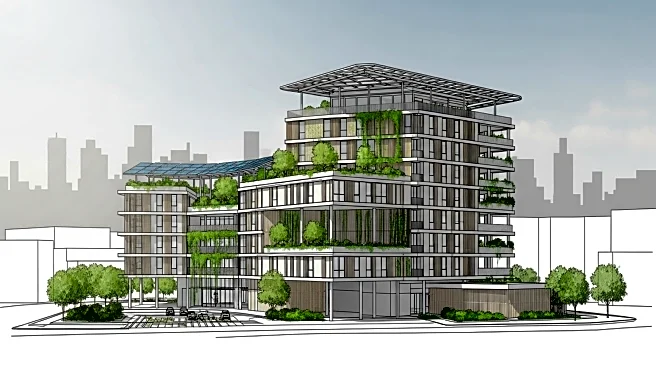What's Happening?
AXIS Architecture + Design has completed the renovation of the 1 Hotel Seattle, transforming the former Pan Pacific Hotel into a luxury urban retreat inspired by the Pacific Northwest's natural landscapes. The project involved a significant brand conversion, emphasizing sustainability and nature-driven design. AXIS served as both Design Architect and Architect of Record, collaborating with Studio Collective for interior design. The renovation included a complete redesign of the hotel's entrance, lobby, and public spaces, incorporating reclaimed wood and biophilic elements. The hotel aims for LEED Silver certification, with over 70% of construction waste diverted from landfills.
Why It's Important?
The completion of the 1 Hotel Seattle renovation highlights the growing trend of sustainable and nature-inspired design in the hospitality industry. By targeting LEED Silver certification, the project underscores the importance of environmental responsibility in architectural practices. This renovation not only enhances AXIS Architecture's portfolio but also sets a precedent for future hotel projects in the Pacific Northwest. The focus on sustainability and local cultural elements may influence other firms to adopt similar practices, potentially leading to broader industry shifts towards eco-friendly design.
What's Next?
The successful completion of the 1 Hotel Seattle renovation positions AXIS Architecture + Design as a leader in sustainable hospitality design. The firm may continue to expand its presence in the Pacific Northwest, leveraging its expertise in nature-driven design to attract new projects. The hotel's focus on sustainability could inspire other hospitality brands to pursue similar renovations, potentially increasing demand for eco-friendly architectural solutions. Additionally, the achievement of LEED Silver certification may encourage AXIS to aim for higher sustainability standards in future projects.
Beyond the Headlines
The renovation of 1 Hotel Seattle not only reflects architectural innovation but also cultural sensitivity, incorporating elements inspired by the Duwamish Tribe. This approach highlights the importance of integrating local heritage into modern design, fostering a deeper connection between guests and the region. The project's emphasis on biophilic design aligns with growing consumer demand for wellness-focused environments, suggesting a shift in hospitality trends towards spaces that promote health and well-being.










